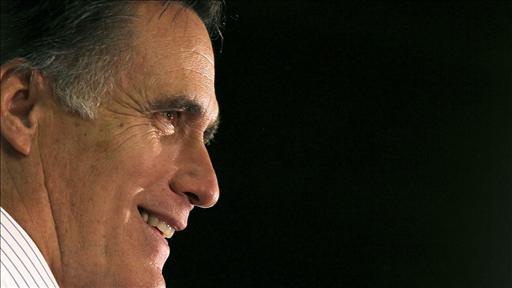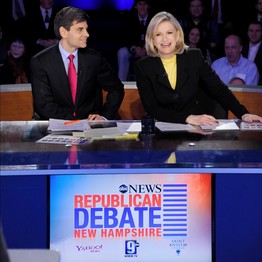The Stephanopoulos Standard
Republicans can turn media bias to their advantage.
By William McGurn
WSJ.com
A funny thing happened on the way to the New
Hampshire primary: ABC moderator George
Stephanopoulos embarrassed himself on national
television with questions plainly intended to
embarrass the Republican candidates. Therein lies a
lesson.
On Saturday night, Mr. Stephanopoulos stepped
outside the role of honest interlocutor when he
pursued Mitt Romney with the issue on nobody's lips
or legislative agenda: whether states have the right
to ban contraception. Likewise, fellow moderator
Diane Sawyer, who asked Republicans what they would
say, "sitting in their living rooms," to a gay
couple.
As the audience appreciated—they booed after Mr. Stephanopolous's sixth follow-up—these questions were designed less to illuminate than to paint Republicans as people who hate gays and are so crazy they might just ban contraception if elected.
For conservatives, this is nothing new.
Conservatives are used to a world where the referees
often seem to be playing for the other team. In this
case, however, the responses from the candidates
were revealing.
Rick Santorum essentially answered directly,
opposing the Supreme Court's definition of privacy
and defending traditional marriage. On the question
about gays, Newt Gingrich called marriage between a
man and a woman a defining part of our civilization.
He then turned the question back on Ms. Sawyer,
wondering why the press never asks about how
same-sex marriage is driving the Catholic Church out
of the adoption business. As for state bans on
contraception, Mr. Romney noted that no state was in
fact proposing to do so, "and asking me whether they
could do it or not is kind of a silly thing."
If this were an academic exercise, Mr. Santorum
might score highest. Even those who disagree with
him would concede that his answers were on point. He
knows what he believes and why, and he does not run
away when asked to defend the hard position.
Mr. Gingrich's answer showed why he remains
popular among many Republican quarters despite his
considerable baggage. Unlike those who strike
conservative voters as too polite or deferential to
lordly media figures, Mr. Gingrich calls bias by its
name. And he was right to point out that there are
serious consequences (such as adoption) to the
legalization of same-sex marriage that the news
media mostly choose to ignore.
Nevertheless, Mr. Romney trumped. He didn't shy
away from the substance, confirming that he favors
repeal of Roe v. Wade and
explaining the constitutional way to oppose court
decisions when you believe one has been wrongly
decided. But when he dismissed the whole line of
questioning as "silly," he made Mr. Stephanopoulos
look ridiculous.
That's something to remember going forward. Yes,
it's unfair that Democratic candidates such as
President Obama can count on the media to amplify
their biases against Republicans.
Bias, however, is a fact of American political life. Merely complaining about it doesn't move the ball.
No one appreciated this more than Ronald Reagan.
Today we remember the Gipper as a popular and
beloved American figure. That's not the way he was
presented to the American public when he was running
against Jimmy Carter in 1980. Back then, Mr. Reagan
was cast as a divisive, Neanderthal warmonger
itching to push the nuclear button.
President Carter played to this image. A "MacNeil/Lehrer
Report" after the single presidential debate that
year noted that Mr. Carter had used the word
"dangerous" six times. Another observer added that
the president had also called Reagan "heartless,"
"insensitive," "misleading," "disturbing" and
"irresponsible."
Mr. Reagan didn't let it get to him. When Mr.
Carter implied Mr. Reagan was against Medicare
because he opposed all efforts to help provide
decent health care for American citizens, Mr. Reagan
smiled and shook his head. Then he issued four
devastating words that have now entered the
political lexicon: "There you go again."
There's a good lesson here. Whatever else we know
about 2012, we know we will have many more
Stephanopoulos moments ahead. Though it might be
more satisfying to thunder against the injustice,
there are other, possibly more effective ways to
expose the bias.
On the social issues especially, the media
narrative is that Republicans are obsessed. The
truth is that at a time when millions of Americans
can't find work, when our Middle East policy is in
turmoil, when the future of Mr. Obama's signature
legislative achievement—health care—is in question,
every Republican in the running is itching for the
opportunity to talk about how he would address these
things.
In sharp contrast, it was Mr. Stephanopoulos and
Ms. Sawyer who showed themselves consumed with
nonexistent initiatives on contraception and what
you might say to gay friends who are sitting in your
living room. Saturday night on ABC, we saw this bias
in its full, condescending form.
We also saw something less well appreciated: that
a Republican candidate can turn it to his advantage.
Write to MainStreet@wsj.com



